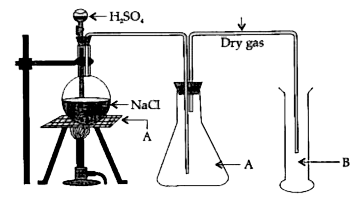For the preparation of hydrochloric acid in the laboratory :
Why is direct absorption of hydrogen chloride gas in water not feasible ?
To answer the question regarding the preparation of hydrochloric acid in the laboratory and the feasibility of directly absorbing hydrogen chloride gas in water, we can break down the explanation into several steps:
1. Understanding the Reaction:
- Hydrochloric acid (HCl) can be prepared in the laboratory by reacting sodium chloride (NaCl) with concentrated sulfuric acid (H2SO4).
- The reaction produces sodium hydrogen sulfate (NaHSO4) and hydrogen chloride gas (HCl).
2. Properties of Hydrogen Chloride Gas:
- Hydrogen chloride gas is known to be highly soluble in water, but this solubility comes with significant heat release.
3. Exothermic Nature of Dissolving HCl:
- When hydrogen chloride gas is dissolved in water, the process is highly exothermic, meaning it releases a large amount of heat.
- This heat can lead to boiling and splattering of the solution, which can be dangerous.
4. Risks of Direct Absorption:
- Directly absorbing hydrogen chloride gas into water poses risks due to the heat generated. This can cause the solution to become very hot, potentially leading to accidents or injuries.
5. Alternative Method:
- Instead of direct absorption, a safer method is used. An inverted funnel setup is employed to collect the hydrogen chloride gas.
- This setup allows for the gas to be absorbed into water without the risk of back suction or direct contact with the water.
6. Benefits of the Inverted Funnel Setup:
- The inverted funnel provides a larger surface area for the gas to dissolve, ensuring maximum absorption while minimizing the risks associated with heat generation.
Conclusion:
Direct absorption of hydrogen chloride gas in water is not feasible due to the highly exothermic nature of the dissolution process, which can lead to dangerous conditions. Instead, a safer method involving an inverted funnel is used to facilitate the absorption of the gas into water.
---
- Hydrochloric acid (HCl) can be prepared in the laboratory by reacting sodium chloride (NaCl) with concentrated sulfuric acid (H2SO4).
- The reaction produces sodium hydrogen sulfate (NaHSO4) and hydrogen chloride gas (HCl).
- Hydrogen chloride gas is known to be highly soluble in water, but this solubility comes with significant heat release.
- When hydrogen chloride gas is dissolved in water, the process is highly exothermic, meaning it releases a large amount of heat.
- This heat can lead to boiling and splattering of the solution, which can be dangerous.
- Directly absorbing hydrogen chloride gas into water poses risks due to the heat generated. This can cause the solution to become very hot, potentially leading to accidents or injuries.
- Instead of direct absorption, a safer method is used. An inverted funnel setup is employed to collect the hydrogen chloride gas.
- This setup allows for the gas to be absorbed into water without the risk of back suction or direct contact with the water.
- The inverted funnel provides a larger surface area for the gas to dissolve, ensuring maximum absorption while minimizing the risks associated with heat generation.
Direct absorption of hydrogen chloride gas in water is not feasible due to the highly exothermic nature of the dissolution process, which can lead to dangerous conditions. Instead, a safer method involving an inverted funnel is used to facilitate the absorption of the gas into water.
Topper's Solved these Questions
- STUDY OF COMPOUNDS OF CHLORINE - HYDROGEN CHLORIDE Book:ICSEChapter:STUDY OF COMPOUNDS OF CHLORINE - HYDROGEN CHLORIDE Exercise:ADDITIONAL QUESTION FOR PRACTICE
Explore 25 Videos
- STUDY OF COMPOUNDS - SULPHURIC ACID Book:ICSEChapter:STUDY OF COMPOUNDS - SULPHURIC ACID Exercise:UNIT TEST PAPER 7D - SULPHURIC ACID
Explore 31 Videos
- STUDY OF COMPOUNDS OF NITROGEN - NITRIC ACIDBook:ICSEChapter:STUDY OF COMPOUNDS OF NITROGEN - NITRIC ACIDExercise:QUESTIONS FROM PREVIOUS ICSE BOARD PAPERS
Explore 54 Videos
Similar Questions
For the preparation of hydrochloric acid in the laboratory 0=- I ] State why direct absorption of hydrogen gas in water is not feasible . Ii ] State what arrangement is used to dissolve hydrogen chloride gas in water.
View SolutionName the acid used for the preparation of hydrogen chloride gas in the laboratory. Why is this particular acid preferred to other acids?
View SolutionHow hydrogen chloride is prepared in the laboratory ?
View SolutionAcid used in the laboratory for preparation of hydrogen.
View SolutionWith respect to the laboratory preparation of hydrochloric acid answer the following question :
Which method is used to collect hydrogen chloride gas ?
View SolutionWrite the balanced chemical equation for the laboratory preparation of hydrogen chloride gas.
View SolutionDraw a neat labelled diagram for the preparation of hydrogen chloride gas in the laboratory. Write the equation involved in the reaction.
View SolutionWrite balanced chemical equations for the preparation of the following salts in the laboratory:
A soluble chloride by the action of an acid on a metal.
View SolutionGive reasons why?
For the preparation of hydrochloric acid, hydrogen is not directly absorbed in water.
View SolutionWith respect to the laboratory preparation of hydrochloric acid answer the following question :
How can hydrochloric acid be prepared from substance B ?

View Solution